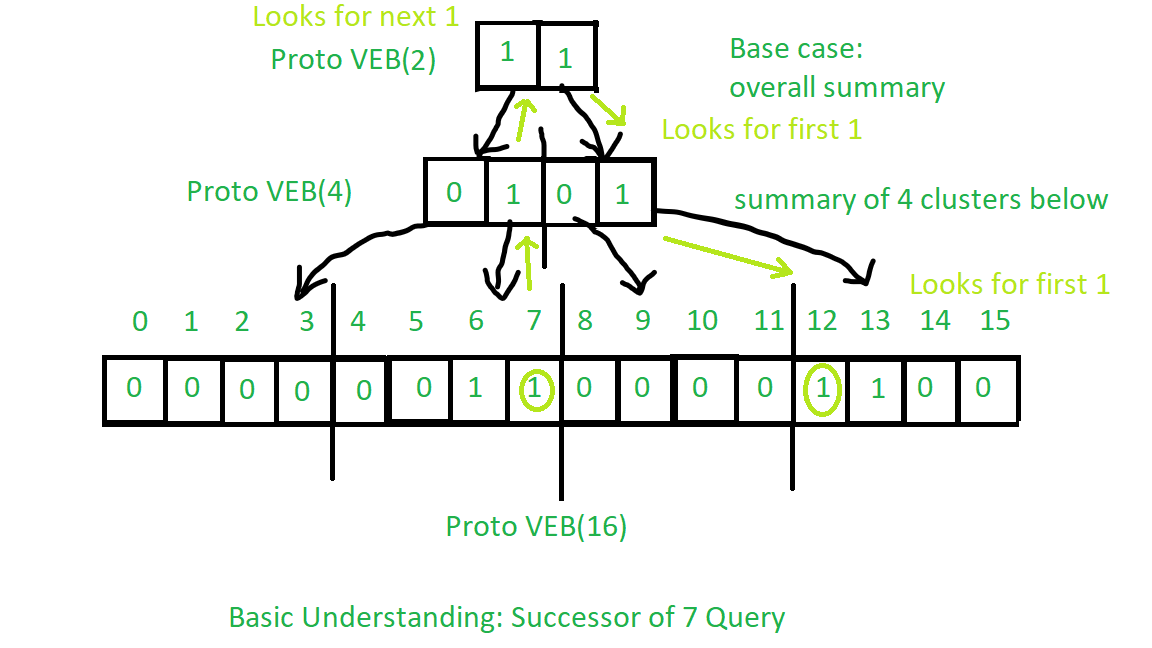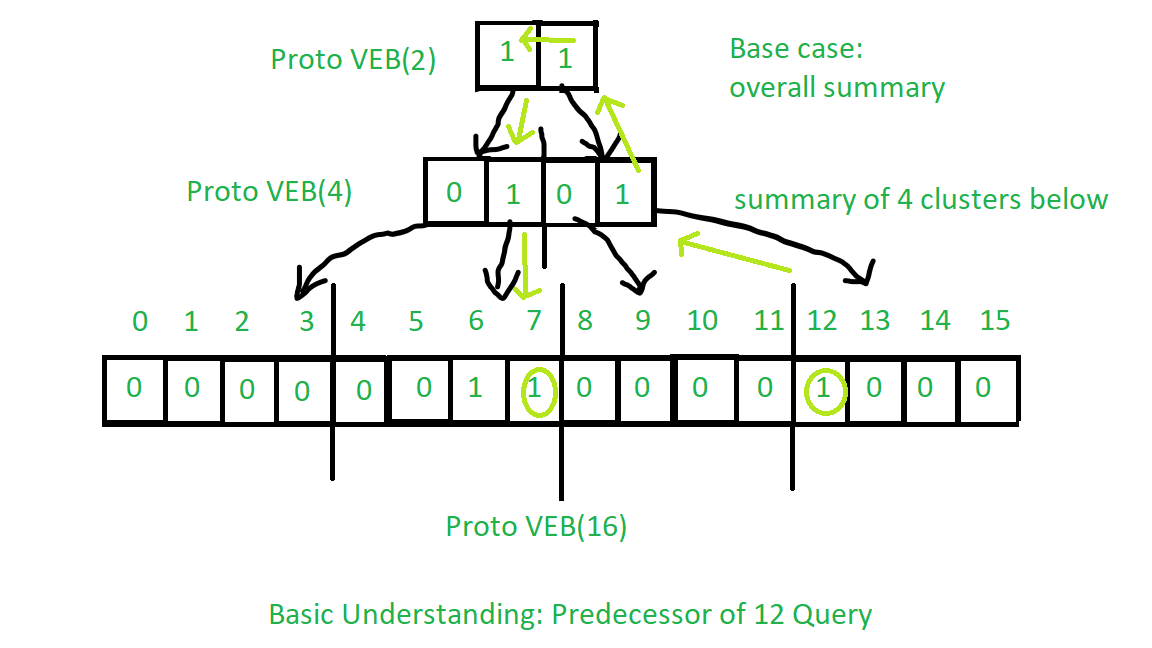Дерево Прото Ван Эмде Боас | Набор 6 | Запрос: преемник и предшественник
Пожалуйста, сначала ознакомьтесь со всеми предыдущими статьями о Древе Прото Ван Эмде Боаса.
Процедура запроса преемника:
- Базовый случай: для Proto-VEB размера 2 единственная возможность состоит в том, что ключ равен 0, и если следующий ключ присутствует, то он является его преемником или нет преемника. Таким образом, применяется та же процедура.
- Рекурсия:
- Во-первых, мы посмотрим в текущем кластере (означает кластер, в котором присутствует ключ запроса), если есть какой-либо ключ, больший, чем присутствует ключ запроса, тогда мы будем преемником, поэтому мы его возвращаем.
- Если это не так, то мы рекурсивно вызовем процедуру-преемник поверх сводки, чтобы найти следующее истинное значение в сумме. Если в сводке нет следующего истинного значения, мы вернем -1 как знак того, что нет большего ключа.
- В вышеупомянутой операции, если мы найдем любое следующее истинное значение, мы найдем минимальный ключ, присутствующий в этом кластере, который будет преемником ключа запроса.
См. Изображение ниже для базового понимания работы запроса преемника:
Процедура для предшественника такая же, как для преемника с некоторыми незначительными изменениями, вы должны попытаться понять это из приведенного выше описания для запроса преемника. См. Изображение ниже для базового понимания:

Below is the implementation:
// C++ implementation of the approach#include <bits/stdc++.h>using namespace std; class Proto_Van_Emde_Boas {public: // Total number of keys int universe_size; // Summary Proto_Van_Emde_Boas* summary; // Clusters array of Proto-VEB pointers vector<Proto_Van_Emde_Boas*> clusters; int root(int u) { return int(sqrt(u)); } // Function to return cluster numbers // in which key is present int high(int x) { return x / root(universe_size); } // Function to return position of x in cluster int low(int x) { return x % root(universe_size); } // Function to return the index from // cluster number and position int generate_index(int cluster, int position) { return cluster * root(universe_size) + position; } // Constructor Proto_Van_Emde_Boas(int size) { universe_size = size; // Base case if (size <= 2) { // Set summary to nullptr as there is no // more summary for size 2 summary = nullptr; // Vector of two pointers // nullptr in starting clusters = vector<Proto_Van_Emde_Boas*>(size, nullptr); } else { // Assiging Proto-VEB(sqrt(u)) to summary summary = new Proto_Van_Emde_Boas(root(size)); // Creating array of Proto-VEB Tree pointers of size sqrt(u) // first all nullptrs are going to assign clusters = vector<Proto_Van_Emde_Boas*>(root(size), nullptr); // Assigning Proto-VEB(sqrt(u)) to all its clusters for (int i = 0; i < root(size); i++) { clusters[i] = new Proto_Van_Emde_Boas(root(size)); } } }}; // Function that returns true if the// key is present in the treebool isMember(Proto_Van_Emde_Boas* helper, int key){ // If key is greater then universe_size then // returns false if (key >= helper->universe_size) return false; // If we reach at base case // the just return whether // pointer is nullptr then false // else return true if (helper->universe_size == 2) { return helper->clusters[key]; } else { // Recursively go deep into the // level of Proto-VEB tree using its // cluster index and its position return isMember(helper->clusters[helper->high(key)], helper->low(key)); }} // Function to insert a key in the treevoid insert(Proto_Van_Emde_Boas*& helper, int key){ // If we reach at base case // then assign Proto-VEB(1) in place // of nullptr if (helper->universe_size == 2) { helper->clusters[key] = new Proto_Van_Emde_Boas(1); } else { // Recursively using index of cluster and its // position in cluster insert(helper->clusters[helper->high(key)], helper->low(key)); // Also do the same recusion in summary VEB insert(helper->summary, helper->high(key)); }} // Function to return the minimum key from the treeint minimum(Proto_Van_Emde_Boas* helper){ // Base case chooses the least key // present in the cluster if (helper->universe_size == 2) { if (helper->clusters[0]) { return 0; } else if (helper->clusters[1]) { return 1; } // No keys present then return -1 return -1; } else { // Recursively find in summary for // first 1 present in Proto-VEB int minimum_cluster = minimum(helper->summary); int offset; // If no key is present in // the cluster then return -1 if (minimum_cluster == -1) { return -1; } else { // Recursively find the position of the key // in the minimum_cluster offset = minimum(helper->clusters[minimum_cluster]); // Returns overall index of minimum key return helper->generate_index(minimum_cluster, offset); } }} // Function to return the maximum key from the treeint maximum(Proto_Van_Emde_Boas* helper){ // Return the maximum key present in // the cluster if (helper->universe_size == 2) { if (helper->clusters[1]) { return 1; } else if (helper->clusters[0]) { return 0; } // Return -1 if no keys present in the // cluster return -1; } else { // Recursively find the last 1 present // in the summary int maximum_cluster = maximum(helper->summary); int offset; // If no key is present in // the cluster then return -1 if (maximum_cluster == -1) { return -1; } else { // Recursively find the position of the key // in the maximum_cluster offset = maximum(helper->clusters[maximum_cluster]); return helper->generate_index(maximum_cluster, offset); } }} // Function to return the successor of key in the treeint successor(Proto_Van_Emde_Boas* helper, int key){ // Base case, returns key greater than // our query key in the cluster if present // else returns -1 if (helper->universe_size == 2) { if (key == 0 && helper->clusters[1]) return 1; else return -1; } else { // Check if any key is greater than query key in the cluster int offset = successor(helper->clusters[helper->high(key)], helper->low(key)); // If it is present then return its index if (offset != -1) return helper->generate_index(helper->high(key), offset); else { // If no successor is present within the cluster then // go to the summmary and find the next summary with // key present(1) named successor_cluster int successor_cluster = successor(helper->summary, helper->high(key)); // If no next 1 in the summary then return -1 if (successor_cluster == -1) return -1; else { // Find the minimum key in the successor_cluster offset = minimum(helper->clusters[successor_cluster]); // Generate its index and return return helper->generate_index(successor_cluster, offset); } } }} // Function to return the predecessor of key in the treeint predecessor(Proto_Van_Emde_Boas* helper, int key){ // Base case, find smaller key present in // the cluster // If present else return -1 if (helper->universe_size == 2) { if (key == 1 && helper->clusters[0]) return 0; else return -1; } else { // Check if any key is lower than query key in the cluster int offset = predecessor(helper->clusters[helper->high(key)], helper->low(key)); // If it is present then return its index if (offset != -1) return helper->generate_index(helper->high(key), offset); else { // If no predecessor is present within the cluster then // go to the summmary and find the next summary with // key present(1) named predecessor_cluster int predecessor_cluster = predecessor(helper->summary, helper->high(key)); // If no next 1 in the summary then return -1 if (predecessor_cluster == -1) return -1; else { // Find the maximum key in the predecessor_cluster offset = maximum(helper->clusters[predecessor_cluster]); // Generate its index and return return helper->generate_index(predecessor_cluster, offset); } } }} // Function to delete a key from the treevoid pveb_delete(Proto_Van_Emde_Boas*& helper, int key){ // Base case: If the key is present // then make it nullptr if (helper->universe_size == 2) { if (helper->clusters[key]) { delete helper->clusters[key]; helper->clusters[key] = nullptr; } } else { // Recursive delete to reach at the base case pveb_delete(helper->clusters[helper->high(key)], helper->low(key)); bool isanyinCluster = false; // Iterate over the cluster of keys to check whether // any other key is present within that cluster // If yes then we should not update summary to 0 // else update summary to 0 for (int i = helper->high(key) * helper->root(helper->universe_size); i < (helper->high(key) + 1) * helper->root(helper->universe_size); i++) { // If member is present then break the loop if (isMember(helper->clusters[helper->high(key)], i)) { isanyinCluster = true; break; } } // If no member is present then // update summary to zero if (isanyinCluster == false) { pveb_delete(helper->summary, helper->high(key)); } }} // Driver codeint main(){ Proto_Van_Emde_Boas* hello = new Proto_Van_Emde_Boas(16); cout << boolalpha; insert(hello, 2); insert(hello, 13); insert(hello, 3); cout << successor(hello, 3) << endl; cout << predecessor(hello, 13) << endl;} |
Отношение повторения для запросов преемника и предшественника:
Т (и) = Т (и) = 2Т ()) + O (log2 (
))
Сложность времени: O (log2 (u) * log2 (log2 (u)))
Вниманию читателя! Не прекращайте учиться сейчас. Освойте все важные концепции DSA с помощью самостоятельного курса DSA по приемлемой для студентов цене и будьте готовы к работе в отрасли. Чтобы завершить подготовку от изучения языка к DS Algo и многому другому, см. Полный курс подготовки к собеседованию .
Если вы хотите посещать живые занятия с отраслевыми экспертами, пожалуйста, обращайтесь к Geeks Classes Live и Geeks Classes Live USA.